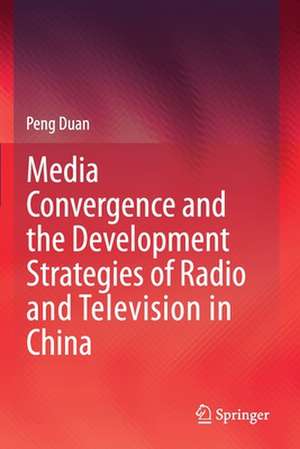Media Convergence and the Development Strategies of Radio and Television in China
Autor Peng Duanen Limba Engleză Paperback – 2 dec 2021
This book discusses the development strategies of Chinese media convergence in the current, fast-changing communication environment. Drawing on both theoretical and empirical data and based on the author’s observations, focus groups, and in-depth analyses of selected Chinese radio and TV networks, it illustrates key lessons for the maintenance and future improvement of talents, advertisement, media organization management, business development, and coping strategies. Further, it outlines a framework that helps readers to consider how to use communication strategies for the construction of media convergence in the context of China by referring to theories of international communication and political communication.
Presenting research on the development strategies of Chinese media convergence, it offers a systematic study of the processes through which the Chinese radio and television industries make use of proper communication strategies to have a profoundglobal influence.
| Toate formatele și edițiile | Preț | Express |
|---|---|---|
| Paperback (1) | 578.05 lei 6-8 săpt. | |
| Springer Nature Singapore – 2 dec 2021 | 578.05 lei 6-8 săpt. | |
| Hardback (1) | 584.26 lei 6-8 săpt. | |
| Springer Nature Singapore – dec 2020 | 584.26 lei 6-8 săpt. |
Preț: 578.05 lei
Preț vechi: 680.05 lei
-15% Nou
Puncte Express: 867
Preț estimativ în valută:
110.64€ • 114.02$ • 93.41£
110.64€ • 114.02$ • 93.41£
Carte tipărită la comandă
Livrare economică 03-17 martie
Preluare comenzi: 021 569.72.76
Specificații
ISBN-13: 9789813341517
ISBN-10: 9813341513
Pagini: 166
Ilustrații: VIII, 166 p. 1 illus.
Dimensiuni: 155 x 235 mm
Greutate: 0.25 kg
Ediția:1st ed. 2020
Editura: Springer Nature Singapore
Colecția Springer
Locul publicării:Singapore, Singapore
ISBN-10: 9813341513
Pagini: 166
Ilustrații: VIII, 166 p. 1 illus.
Dimensiuni: 155 x 235 mm
Greutate: 0.25 kg
Ediția:1st ed. 2020
Editura: Springer Nature Singapore
Colecția Springer
Locul publicării:Singapore, Singapore
Cuprins
Chapter One: The Rise, Concept and Manifestations of Media Convergence.- Chapter Two: The Challenges and Opportunities Facing Radio and Television Against the Background of Media Convergence.- Chapter Three: Cases of Reforms of Radio and Television Against the Background of Media Convergence.- Chapter Four: Communication strategies of Radio and Television against the Background of Media Convergence.- Chapter Five: Prospects for Media Convergence.
Notă biografică
Professor Peng Duan is the vice-president of the Communication University of China, the executive associate director of the Key State Lab of Media Convergence and Communication (Communication University of China), and the managing editor of the SAGE journal Global Media and China. He is one of China’s leading scholars, with broad experience in journalism and communication studies, particularly in the fields of radio and television news, communication theories and audience analysis.
Textul de pe ultima copertă
This book discusses the development strategies of Chinese media convergence in the current, fast-changing communication environment. Drawing on both theoretical and empirical data and based on the author’s observations, focus groups, and in-depth analyses of selected Chinese radio and TV networks, it illustrates key lessons for the maintenance and future improvement of talents, advertisement, media organization management, business development, and coping strategies. Further, it outlines a framework that helps readers to consider how to use communication strategies for the construction of media convergence in the context of China by referring to theories of international communication and political communication.
Presenting research on the development strategies of Chinese media convergence, it offers a systematic study of the processes through which the Chinese radio and television industries make use of proper communication strategies to have a profoundglobal influence.
Caracteristici
Reviews media convergence strategies of broadcast communication in China Discusses a variety of empirical data from prominent TV and radio stations in China Provides a comprehensive theoretical framework for media convergence in China
